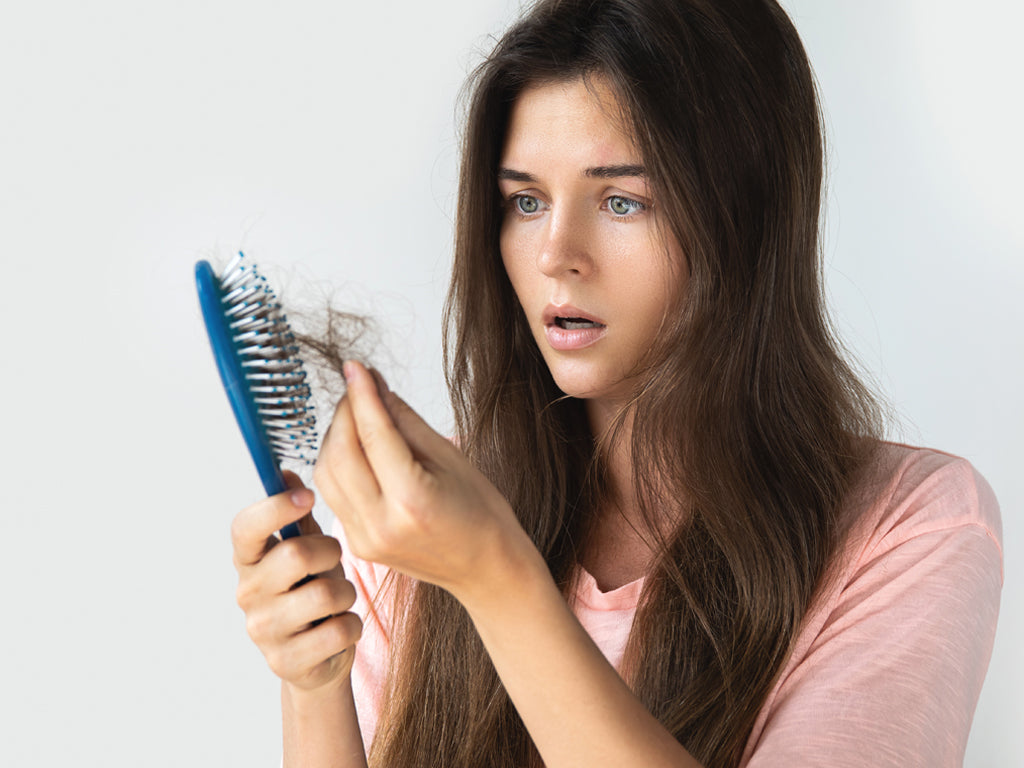Signs of Biotin Deficiency And How to Replenish It?

Are you struggling with hair fall or hair thinning issues? Or, do skin problems like dry skin or rashes bother you these days?
Then, there is a high probability it could be due to biotin deficiency.
While pollution and unhealthy lifestyles are often considered responsible for these issues, a lower level of biotin vitamin also leads to such problems.
Several factors can cause a biotin deficiency in the body, and an imbalanced diet is one among them. Luckily, there are some dietary supplements, like biotin vitamin 5000, that help fill the gap, balancing the required biotin level in the body.
In the following sections, we’ll delve into the significance of the biotin vitamin in our body, along with the signs and symptoms of its deficiency and how to diagnose them. Let’s delve in!
What is Biotin?
The vitamin B group comprises eight vitamins - B1, B2, B3, B5, B6, B7, B9, B12. Vitamin B7 or biotin is a water-soluble vitamin that helps the body convert food into energy.
Unfortunately, the human body does not produce water-soluble vitamins and does not store them for long either. Certain bacteria present inside the intestine can synthesize biotin in your body. Besides, some food items can provide your body with vitamin B7.
What Causes Biotin Deficiency?
A biotin deficiency can occur in individuals of any age. Here are a few factors that may cause a lower level of biotin in your body.
-
Medications
Home high-dosage drugs or certain medicines, like antibiotics or anti-seizure drugs, can hinder biotin absorption in the body. Additionally, antibiotics can destroy good bacteria in the intestine that synthesize biotin.
-
Long-term Strict Dieting
Following a strict diet for a longer time may lead to a lower level of biotin in the body. Sometimes, your choice of selective food items can prevent your body from getting all vitamins and minerals, leading to a deficiency of particular vitamins, such as B7.
-
Intravenous Feeding
Sometimes, tube feeding can lead to biotin deficiency since some enteral nutrition formulas may not contain adequate levels of biotin. Also, storage conditions or exposure to light and heat can affect biotin stability in formula solutions. This degradation can result in lower levels of biotin being delivered to the patient.
-
Intestinal Issues
Chronic intestinal problems might be responsible for inadequate biotin levels in the body. Such problems may affect intestinal flora or good bacteria that produce biotin in the gut.
-
Genetic Causes
Some genetic disorders, such as phenylketonuria, holocarboxylase synthetase deficiency, and biotin transport deficiency, may also cause a lower level of biotin in the body.
How to Know If You Have Biotin Deficiency?
Biotin is also known as vitamin H, and the ‘H’ stands for ‘Haar und Haut’- the German phrase meaning ‘hair and skin'. A lower level of biotin mainly impacts the hair, skin, and nails.
Here are a few signs of biotin deficiency:
-
Hair Loss Issues
Biotin has an important role to play in the body’s keratin production, which supports healthy hair growth. If you’re struggling with a biotin deficiency, you may experience hair loss, thinning, and shedding.
-
Dry & Pale Skin
Biotin is also responsible for healthy skin. This vitamin is involved in the production of fatty acids which nourish the skin, providing a soothed, glowing appearance. A lack of biotin may lead to skin problems such as dermatitis, dryness, redness, and rashes.
-
Weak or Brittle Nails
Keratin supports the healthy growth of nails. Since biotin supports keratin production in the body, its deficiency may cause weak or brittle nails. A biotin vitamin 5000 dietary supplement can help strengthen your nails, maintaining the balance of this vitamin.
Many other issues may occur due to a deficiency of biotin.
- Fatigue
- Nausea
- Dry eyes
- Sleep disorders or insomnia
- Loss of appetite
- Depression
- Burning or tingling sensation in hands and feet
- Cracky or dry corner of the mouth
- Muscle pain
How to Diagnose a Biotin Deficiency?
You can treat a biotin deficiency in two ways-
1. Food Sources
Here are some foods that are rich sources of biotin-
- Legumes like lentils, peas, soybeans, and beans
- Nuts and seeds, such as almonds, walnuts, peanuts, and sunflower seeds
- Whole grains
- Mushroom and yeast
- Fruits like banana, avocado
- Vegetables like sweet potato, broccoli, carrots, cauliflower
- Egg, especially the yolk
- Organ meat, especially liver
2. Dietary Supplements
Incorporating biotin-rich foods into your diet is a great way to maintain your vitamin balance. However, dietary sources alone may not be sufficient for those dealing with severe biotin deficiency. In such cases, a supplement like biotin vitamin 5000 could be a beneficial addition to your daily diet.
Wrap Up
Your body needs vitamin B7 or biotin to metabolize fat, carbohydrate, and protein. By supporting the body’s amino acids and keratin production, the vitamin plays a vital role in maintaining healthy hair, skin, and nails.
Biotin supplements are often recommended to celebrities and people concerned about their hair and skin health. If you feel like you have a biotin deficiency, the GI Prohealth biotin vitamin 5000 supplement can be a helpful add-on to your daily diet.
Make sure to talk with a healthcare specialist before taking any dietary supplements, especially when you’re giving them to a child.
